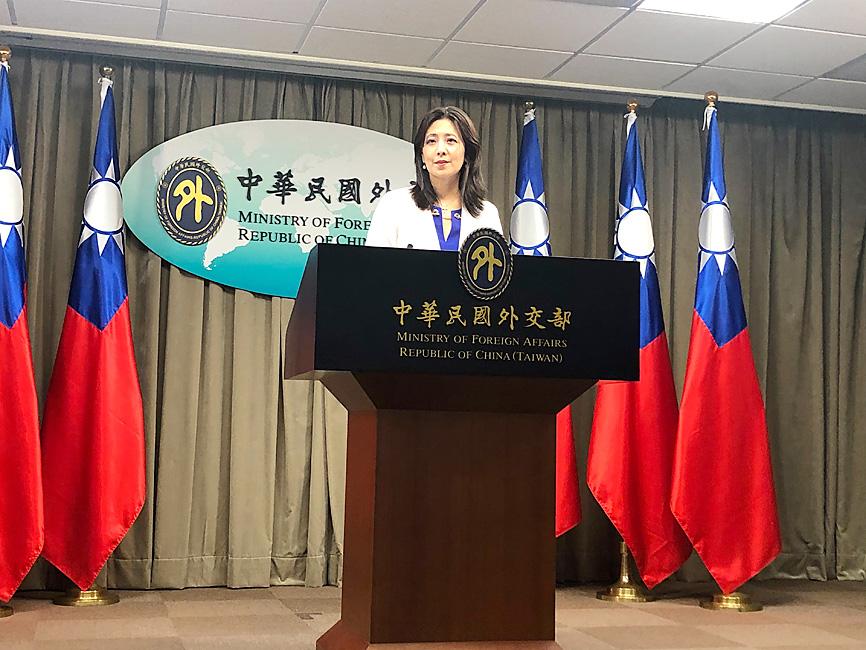The Republic of China (Taiwan) is a sovereign nation, not part of the People’s Republic of China (PRC), the Ministry of Foreign Affairs said yesterday, after Washington said it does not support Taiwanese independence.
“We support a strong unofficial relationship with Taiwan. We do not support Taiwan’s independence. We fully recognize, understand the sensitivities involved here,” US National Security Council Indo-Pacific Coordinator Kurt Campbell said on Tuesday during a videoconference with the Asia Society Policy Institute (ASPI).
Campbell made the remarks when asked by ASPI International Security and Diplomacy vice president Daniel Russel how much love and support Washington can show to Taiwan under its “one China” policy and the US’ Taiwan Relations Act.

Photo: Lu Yi-hsuan, Taipei Times
Taiwan has the right to live in peace and should have a role to play in the international community, particularly in areas related to vaccines and the COVID-19 pandemic, Campbell said.
He said that there is a “dangerous” balance to maintain across the Taiwan Strait and warned China about “catastrophic” results if it dares to do to Taiwan what it has done to Hong Kong.
In Taipei, the Ministry of Foreign Affairs thanked Washington for supporting Taiwan’s participation in international affairs and having donated it 2.5 million COVID-19 vaccines.
Since taking office, US President Joe Biden’s administration has repeatedly stressed that Washington’s support for Taiwan is “rock solid,” while it has also engaged other allies to underscore the importance of peace and stability across the Taiwan Strait, ministry spokeswoman Joanne Ou (歐江安) said in a statement.
As a responsible and reliable partner, Taiwan sustains close cooperation with the US on many regional and global issues, and the nation is glad to continue making contributions to the international society, Ou said.
Ou also asserted the nation’s sovereignty.
“ROC Taiwan is a sovereign nation, not part of the PRC; that is a fact as well as the ‘status quo,’” she said.
The government has been cautiously handling cross-strait relations based on a steady and practical attitude, while defending its liberal democracy and striving for more opportunities to participate in international affairs, Ou said.
The ministry would continue to work closely with the US and deepen bilateral partnerships based on firm foundations, she said.
In other news, the ministry on Tuesday night welcomed the appointment of Sandra Oudkirk — US senior official for APEC and deputy assistant secretary for Australia, New Zealand and the Pacific Islands — as the next director of the American Institute in Taiwan (AIT), making her the first female director of the US’ de facto embassy.
“The @StateDept official brings a wealth of experience to the role, it’s expected the #Taiwan-#US relationship will continue flourishing under her watch,” the ministry wrote on Twitter yesterday.

ENDEAVOR MANTA: The ship is programmed to automatically return to its designated home port and would self-destruct if seized by another party The Endeavor Manta, Taiwan’s first military-specification uncrewed surface vehicle (USV) tailor-made to operate in the Taiwan Strait in a bid to bolster the nation’s asymmetric combat capabilities made its first appearance at Kaohsiung’s Singda Harbor yesterday. Taking inspiration from Ukraine’s navy, which is using USVs to force Russia’s Black Sea fleet to take shelter within its own ports, CSBC Taiwan (台灣國際造船) established a research and development unit on USVs last year, CSBC chairman Huang Cheng-hung (黃正弘) said. With the exception of the satellite guidance system and the outboard motors — which were purchased from foreign companies that were not affiliated with Chinese-funded

PERMIT REVOKED: The influencer at a news conference said the National Immigration Agency was infringing on human rights and persecuting Chinese spouses Chinese influencer “Yaya in Taiwan” (亞亞在台灣) yesterday evening voluntarily left Taiwan, despite saying yesterday morning that she had “no intention” of leaving after her residence permit was revoked over her comments on Taiwan being “unified” with China by military force. The Ministry of the Interior yesterday had said that it could forcibly deport the influencer at midnight, but was considering taking a more flexible approach and beginning procedures this morning. The influencer, whose given name is Liu Zhenya (劉振亞), departed on a 8:45pm flight from Taipei International Airport (Songshan airport) to Fuzhou, China. Liu held a news conference at the airport at 7pm,

Taiwan was ranked the fourth-safest country in the world with a score of 82.9, trailing only Andorra, the United Arab Emirates and Qatar in Numbeo’s Safety Index by Country report. Taiwan’s score improved by 0.1 points compared with last year’s mid-year report, which had Taiwan fourth with a score of 82.8. However, both scores were lower than in last year’s first review, when Taiwan scored 83.3, and are a long way from when Taiwan was named the second-safest country in the world in 2021, scoring 84.8. Taiwan ranked higher than Singapore in ninth with a score of 77.4 and Japan in 10th with

GRIDLOCK: The National Fire Agency’s Special Search and Rescue team is on standby to travel to the countries to help out with the rescue effort A powerful earthquake rocked Myanmar and neighboring Thailand yesterday, killing at least three people in Bangkok and burying dozens when a high-rise building under construction collapsed. Footage shared on social media from Myanmar’s second-largest city showed widespread destruction, raising fears that many were trapped under the rubble or killed. The magnitude 7.7 earthquake, with an epicenter near Mandalay in Myanmar, struck at midday and was followed by a strong magnitude 6.4 aftershock. The extent of death, injury and destruction — especially in Myanmar, which is embroiled in a civil war and where information is tightly controlled at the best of times —